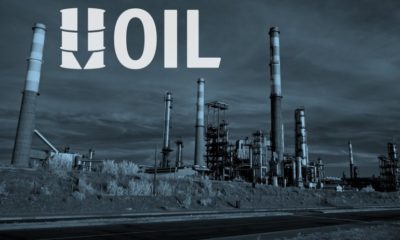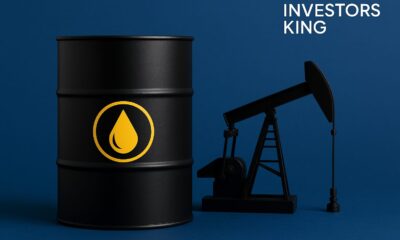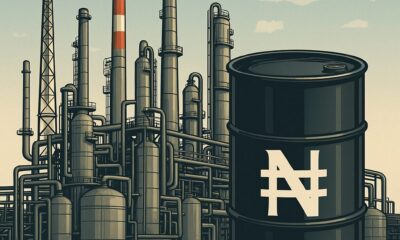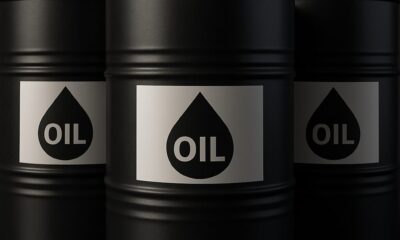Markets
Iraqi Minister: OPEC May Ask Nigeria to Cut Oil Output
Published
8 years agoon

- Iraqi Minister: OPEC May Ask Nigeria to Cut Oil Output
Iraq’s oil minister, Jabar Ali al-Luaibi, has indicated that Nigeria and Libya may be asked to cut oil productions in the new supply cut deal to be reached by the Organisation of Petroleum Exporting Countries (OPEC).
Speaking at a press conference in Baghdad, Al-Luaibi expressed Iraq’s readiness to join Saudi Arabia and Russia in the proposed extension of the oil deal by another nine months.
According to Reuters, OPEC heavyweights Saudi Arabia and Iraq agreed Monday on the need to extend a global cut in oil supply by nine months in an effort to prop up crude oil prices, removing a potential stumbling block as producing countries prepare to meet this week.
Saudi Energy Minister Khalid al-Falih said he did not expect any opposition within OPEC to extending the curbs for a further nine months, speaking after he met his Iraqi counterpart in Baghdad.
Al-Luaibi, however, added that the production cut be increased from the current 1.8 million barrels per day, hinting that “small oil producing countries” who were excused from the initial deal be made to participate in the new deal.
When OPEC and non-OPEC countries made an historic deal in 2016 to cut global crude oil supply, Nigeria and Libya were excused on the basis that both countries were experiencing low production due to geopolitical unrest.
The Minister of State for Petroleum Resources, Dr. Ibe Kachikwu, had also recently said Nigeria would be seeking another six months exemption from the OPEC deal.
OPEC oil ministers will be meeting in Vienna on Thursday to discuss the future of the global crude oil market and prepare for fresh cuts across board.
A cut in production for Nigeria could jeopardise the country’s 2017 budget, which has been benchmarked against an oil production of 2.2 million barrels per day.
In a related development, the Secretary General of the oil cartel, Mr. Mohammad Sanusi Barkindo, has stated that with the rebalancing of the oil market, the organisation was beginning to see light at the end of the tunnel.
His statement came as India’s Minister of Petroleum and Natural Gas Dharmendra Pradhan called on OPEC to ensure “responsible prices” for crude oil, stressing that the cartel should treat Asian markets as primary markets, as its strategy of incentivising Western markets in the past did not result in the retention of those markets.
According to Pradhan, higher crude oil prices would force consuming countries to go for alternative forms of energy, which would slow down the demand for crude oil.
Speaking Monday at the second high-level meeting of the OPEC-India Energy Dialogue held in Vienna, Austria, Barkindo appreciated the bold economic reforms undertaken by India’s Prime Minister Narendra Modi.
According to a statement by the OPEC Secretariat, Barkindo applauded what he described as the de-monetisation and the General Service Tax initiatives and the way India has managed to overcome the global economic slowdown.
He also highlighted the fact that with India’s high growth rate and its dynamic services and strong manufacturing sectors, the country has become a global economic powerhouse.
Barkindo said he saw tremendous value and substance in the energy dialogue, particularly when looking at the ever-expanding co-operation between India and OPEC member countries.
“With OPEC, which is home to over 80 per cent of the world’s proven crude oil reserves, and with many of its member countries well-positioned for exports to India, it is clear that this co-operation will expand further,” Barkindo added.
In his remarks, India’s petroleum minister underlined the importance of the energy dialogue, as well as the co-operation between OPEC member countries and India, with 86 per cent of the country’s crude oil imports coming from OPEC nations.
He called on the cartel to guarantee responsible pricing, as its strategy of incentivising the Western markets in the past did not work.
According to Pradhan, it was expected that the dialogue mechanism would be a useful tool to convey his country’s position to the OPEC member countries.
He said under the leadership of Prime Minister Narendra Modi, India has the most stable political environment with a solid macro-economic base that is largely insulated from the global slowdown.
He noted that he had raised the issue of the “Asian dividend not Asian premium”, adding that the issue of Asian premiums still continues to exist with Indian companies paying billions of dollars on this account.
“They still don’t understand the rationale of this cross-subsidisation of the tariff between West and the East. Coming to the India-OPEC dialogue, it is crucial for us as we import about 86 per cent of our crude, 70 per cent of natural gas, 95 per cent of cooking gas from the OPEC countries.
“OPEC should treat Asian markets as primary markets. Its strategy of incentivising Western markets in the past did not result in retaining those markets.
“I am fully aware that OPEC member countries are in the business of selling oil and not subsidising it. However, my purpose of raising this issue again today is to say don’t subsidise others at our expense.
“I urge OPEC and through you also to Non-OPEC countries to purposefully consider this. The other issue I have been raising is that OPEC should work towards responsible pricing, which would allow major consuming countries to provide energy to the common people.
“Higher prices would force them to go for alternative forms of energy which would be slowing down the demand for crude oil,” he explained.
He also stressed the importance of India’s expanding refining and petrochemicals sector.
His delegation included India’s seven chief executives from both the public and private sectors, who head the 23 refineries in India that process around 4.7 million barrels of crude oil per day.
The high-level meeting saw presentations from OPEC on short-term oil market developments, as well as the long-term energy outlook.
But even as OPEC member countries prepare to meet in Vienna on oil cuts, an explosion at the weekend rocked the Nigerian Gas Company (NGC) pipeline close to Kurutie in Gbaramatu Kingdom, Warri South West Local Government Area of Delta State
The explosion, according to sources, appeared to have been caused by yet-to-be identified saboteurs.
The gas pipeline is located near Camp 5, which was once the base of ex-militant leader, Government Ekpemukpolo, better known as Tompolo, at the height of the first round of militancy experienced in the Niger Delta eight to 12 years ago, but was taken over by the military that established a base there.
The explosion, which occurred between 2 p.m. and 3 p.m. last Saturday, was already impacting NGC’s capacity to meet its gas supply obligations to customers.
Commenting on the incident, the spokesman of Gbaramatu Kingdom, Chief Godspower Gbenekama, said the explosion might have been the result of a rupture on the pipeline, as no community or interests in the kingdom had any reason to attack any government asset in the area.
However, the Community Relations Officer of the Nigeria Gas Processing and Transportation Company (NGPTC), Violin Antaih, said visuals from the site of the incident suggested an act of sabotage.
Antaih, who spoke on the phone to newsmen Monday night, said the incident had all the trappings of deliberate sabotage on the facility, causing a serious breach in the daily operations of the company.
“It’s been confirmed, even by the community people, that it was a third party sabotage. If you have a picture of the blast you will know too well that’s exactly what happened because the pipeline was cut into two, a ruptured pipeline will not have such effect.
“It’s a case of a blast that has left the pipeline the way it is at the moment. If you see the pictures, you will see that this is not just an equipment failure, it was a blast.
“We are still doing our investigation anyway, although it has been confirmed that it was a sabotage because it occurred a few meters from Camp 5, a military base, without even the military being aware of it and we are still trying to get their own input on the attack.
“But investigations are still ongoing and I am sure at the end of the day we’ll have a position on it.
“The pipeline was active when it was attacked. Our people have been sent to the site to ascertain the state of things. We are already feeling the impact on our operations because I understand pressure is completely out because that line is supposed to feed some areas and such areas are already complaining,” Antaih said.
Is the CEO and Founder of Investors King Limited. He is a seasoned foreign exchange research analyst and a published author on Yahoo Finance, Business Insider, Nasdaq, Entrepreneur.com, Investorplace, and other prominent platforms. With over two decades of experience in global financial markets, Olukoya is well-recognized in the industry.

You may like
-


Oil Prices Down for the Week as Supply Worries and Trade Tensions Weigh on Market
-


83 Refineries Licensed as Nigeria Targets Petroleum Export Status by 2027
-


Sanctions and Shrinking Inventory Fuel Over 1% Oil Price Surge
-


Oil Retreats as Tariff Headwinds and Rising OPEC+ Output Pressure Market
-


Brent Crude Oil Climbs 3.2%, WTI Up 3.54% Amid Trade Optimism and Iran Sanctions
-


Nigeria’s Proven Oil Reserves Stand at 31.44 Billion Barrels, Gas Reserves Reach 210.54 TCF



